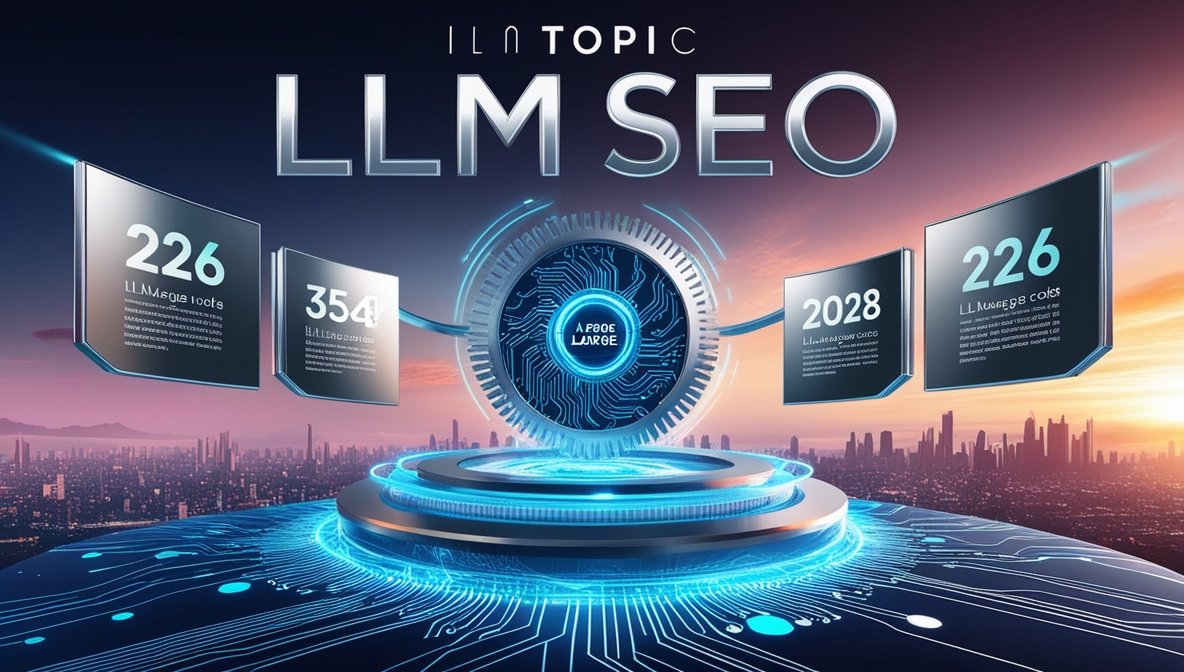Large language models (LLMs) has transformed the digital marketing landscape, particularly in search engine optimization (SEO). Businesses increasingly rely on artificial intelligence-driven content strategies to maintain visibility, drive traffic, and generate engagement.
In 2026, LLMs are expected to redefine the way marketers approach SEO, influencing content creation, keyword targeting, search intent analysis, and performance measurement.
The Evolution of LLMs in SEO
Large language models, powered by advanced machine learning techniques, have progressed far beyond simple text generation. These systems now analyze context, predict search patterns, and adapt content to align with audience behavior. As LLMs continue to mature, they provide marketers with tools to produce high-quality content at scale while reducing manual effort.
LLMs have already impacted SEO by improving the relevance and precision of content. Search engines increasingly prioritize content that addresses user intent, rewards clarity, and maintains factual accuracy. By leveraging LLMs, brands can align their strategies with these criteria efficiently.
Key Trends Shaping LLM SEO in 2026
Several trends are emerging that will define LLM SEO over the next few years. Businesses that integrate these trends into their digital strategies will gain a competitive edge.
1. Contextual Keyword Strategy
Keyword research has evolved into contextual keyword strategy, where relevance extends beyond exact matches. LLMs can identify related terms, semantic connections, and long-tail variations that align with user intent. This approach enables content that ranks higher while providing more value to readers. Companies using advanced SEO with language models can generate content clusters that cover multiple dimensions of a topic, improving both authority and search visibility.
2. AI-Driven Content Generation
By 2026, AI-driven content generation will become standard practice in SEO operations. LLMs can create well-structured articles, meta descriptions, and social media content. They also suggest variations to increase readability, engagement, and alignment with search algorithms. Businesses can deploy LLMs for routine content production, freeing human resources to focus on strategic planning and creative campaigns.
3. Enhanced Search Intent Analysis
Search engines focus on user intent more than ever. LLMs assist in identifying precise intent behind queries, distinguishing between informational, transactional, and navigational needs. This enables marketers to craft content that directly addresses search intent, improving ranking potential and user satisfaction. Over time, LLMs can track shifts in user behavior and suggest adjustments to content strategies in near real-time.
4. Advanced Data Analytics
LLMs contribute to deeper analytics capabilities by processing vast datasets efficiently. SEO teams can use LLMs to interpret performance metrics, extract insights, and forecast trends. This predictive approach reduces reliance on trial-and-error methods, enabling data-driven decisions that improve search rankings and audience engagement.
5. Automated Content Optimization
Content optimization involves aligning copy with SEO best practices while ensuring readability and engagement. LLMs can audit existing content, detect gaps, and recommend improvements. For example, they can adjust keyword distribution, improve internal linking structures, or suggest headings that enhance clarity and SEO performance.
6. Integration with Voice and Visual Search
Voice and visual search continue to gain traction. LLMs enable marketers to adapt content for conversational queries, optimizing for natural language patterns. They also assist in tagging images, generating alt text, and aligning visual content with search engine algorithms. By integrating LLMs into multimedia strategies, brands can enhance search visibility across multiple formats.
7. Ethical AI Practices in SEO
As AI adoption grows, ethical considerations in SEO become critical. LLMs must generate content that is accurate, unbiased, and transparent. Companies are increasingly implementing verification processes to prevent misinformation and maintain trust. Ethical AI practices not only protect brand reputation but also align with evolving regulatory requirements in digital marketing.
8. Real-Time Adaptation
The speed at which search trends evolve requires constant adaptation. LLMs offer real-time insights into shifting search patterns, enabling rapid content updates. Businesses can maintain relevance by responding to new topics, trending questions, or emerging search behavior without delays. This agility is essential for brands seeking to sustain organic traffic growth.
The Impact on Content Strategy
The integration of LLMs into SEO strategies has a profound effect on content planning and execution. Marketers can now focus on high-level strategy, while AI handles repetitive and analytical tasks. This combination improves efficiency and ensures content quality.
Content strategies increasingly emphasize:
-
Topical authority: Creating clusters that address various facets of a subject to establish expertise.
-
User engagement: Using LLMs to generate interactive, readable, and shareable content.
-
Consistency: Maintaining publishing frequency and alignment with search algorithms.
-
Adaptability: Adjusting content based on real-time analytics and search trends.
Brands that incorporate these principles, often with the support of an LLM SEO agency, can achieve higher search rankings, better user engagement, and improved ROI.
Challenges and Considerations
While LLMs offer many benefits, SEO teams face several challenges in adoption:
1. Accuracy and Verification
LLMs generate content based on patterns in existing data, which can sometimes lead to inaccuracies. Teams must implement verification protocols to ensure factual correctness and maintain credibility.
2. Algorithm Dependence
Relying heavily on LLMs could result in over-optimization for current algorithms. SEO professionals must balance AI-generated content with human insight to preserve creativity and differentiation.
3. Resource Allocation
Implementing LLM-based SEO solutions requires investments in technology, training, and integration with existing systems. Companies must evaluate ROI to justify adoption.
4. Ethical and Legal Risks
Improper use of AI content may violate copyright laws, mislead audiences, or breach regulatory standards. Clear policies and monitoring systems are necessary to mitigate these risks.
SEO Guide Benefits: Focus Area
A comprehensive SEO guide that incorporates LLM applications provides measurable benefits:
-
Efficiency: Reduces the time required for keyword research, content creation, and performance monitoring.
-
Accuracy: Guides teams to produce content aligned with current search engine algorithms.
-
Consistency: Maintains uniform standards across multiple pages, domains, and content types.
-
Strategy Alignment: Assists teams in mapping content production to business objectives and target audiences.
-
Adaptation: Supports rapid updates to content in response to search trends, ensuring ongoing relevance.
-
Training Resource: Serves as a reference for team members to learn best practices for integrating LLMs into SEO workflows.
By following a structured guide, companies can leverage AI capabilities effectively while minimizing common pitfalls. This results in higher search rankings, stronger online presence, and better alignment with marketing objectives.
Case Studies: LLM SEO in Action
Several businesses have demonstrated measurable gains by integrating LLMs into SEO strategies:
-
E-commerce Retailers: Increased product page visibility by generating AI-optimized descriptions and related content clusters.
-
Media Publishers: Reduced content production cycles while maintaining quality, resulting in higher organic traffic.
-
B2B Service Providers: Enhanced thought leadership by analyzing competitor content and producing targeted long-form articles.
These examples highlight that when applied strategically, LLMs improve both efficiency and effectiveness in SEO campaigns.
Also Read:- Work with a trusted SEO company in India to grow your organic reach
Looking Ahead: LLM SEO in 2026
As LLMs continue to evolve, they will influence several areas of SEO:
-
Hyper-Targeted Content: AI will enable ultra-specific targeting based on user behavior, intent, and demographics.
-
Automated Audit Systems: LLMs will conduct routine audits, providing actionable recommendations instantly.
-
Cross-Channel Optimization: Integration with email, social media, and voice platforms will broaden SEO impact.
-
Predictive Analytics: AI will forecast trends and suggest proactive adjustments to content strategies.
Businesses that adopt these innovations early will gain a significant advantage over competitors relying solely on traditional methods.
FAQs: SEO Guide Benefits
Q1: How can an SEO guide improve content production efficiency?
An SEO guide provides structured methodologies for keyword selection, content formatting, and performance tracking. Teams can follow the guide to reduce repetitive tasks, avoid errors, and maintain consistent quality.
Q2: Does an SEO guide help align content with search engine algorithms?
Yes. A well-crafted guide outlines current algorithm requirements, ensuring content meets ranking criteria. This reduces the risk of penalties and improves visibility.
Q3: Can an SEO guide support real-time updates?
Modern guides incorporate AI insights, allowing teams to adjust content based on emerging trends and changing user behavior. This ensures content remains relevant and competitive.
Q4: What role does an SEO guide play in team training?
An SEO guide serves as a reference for both new and experienced team members, standardizing practices and providing clear instructions for implementing AI tools effectively.
Q5: How does an SEO guide enhance overall strategy?
By outlining procedures, prioritizing tasks, and mapping content to business objectives, an SEO guide ensures that every piece of content contributes to broader marketing goals.
Conclusion
The role of LLMs in SEO is set to expand significantly by 2026. Businesses that integrate these technologies into their digital strategies will benefit from higher efficiency, improved accuracy, and stronger search performance. Key trends such as contextual keyword strategy, AI-driven content generation, enhanced search intent analysis, and ethical AI practices will define the future of SEO.
By following structured SEO guides and leveraging LLM capabilities, organizations can maintain a competitive edge while adapting to rapidly changing search landscapes. With careful implementation, LLMs will become indispensable tools for businesses aiming to maximize online visibility and achieve measurable marketing success.


